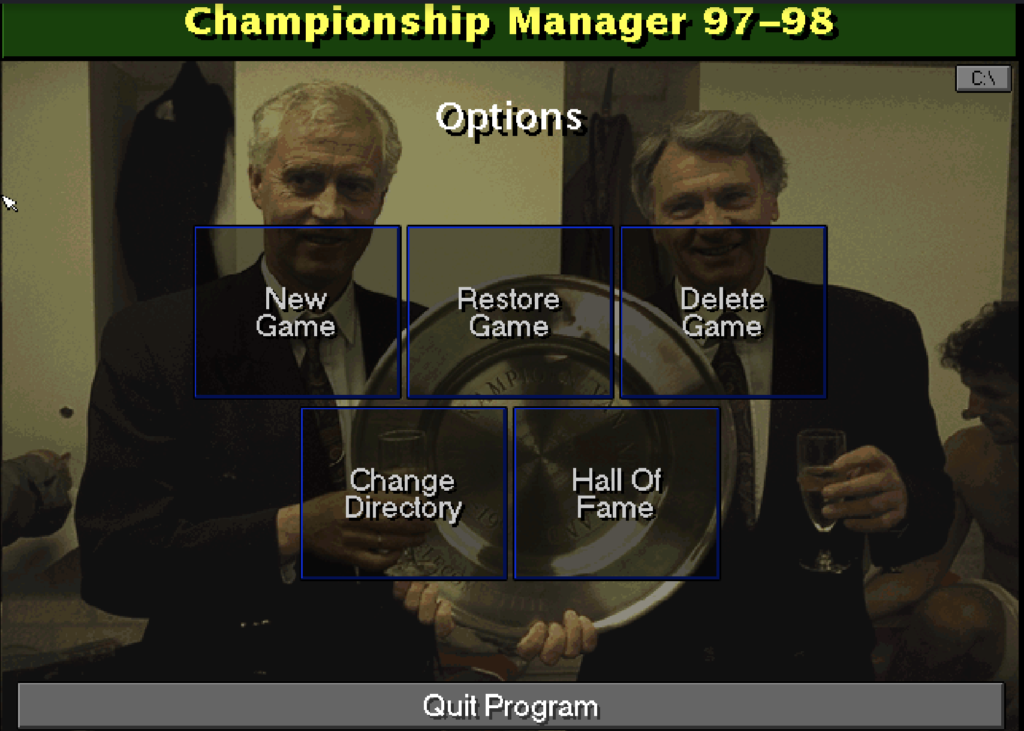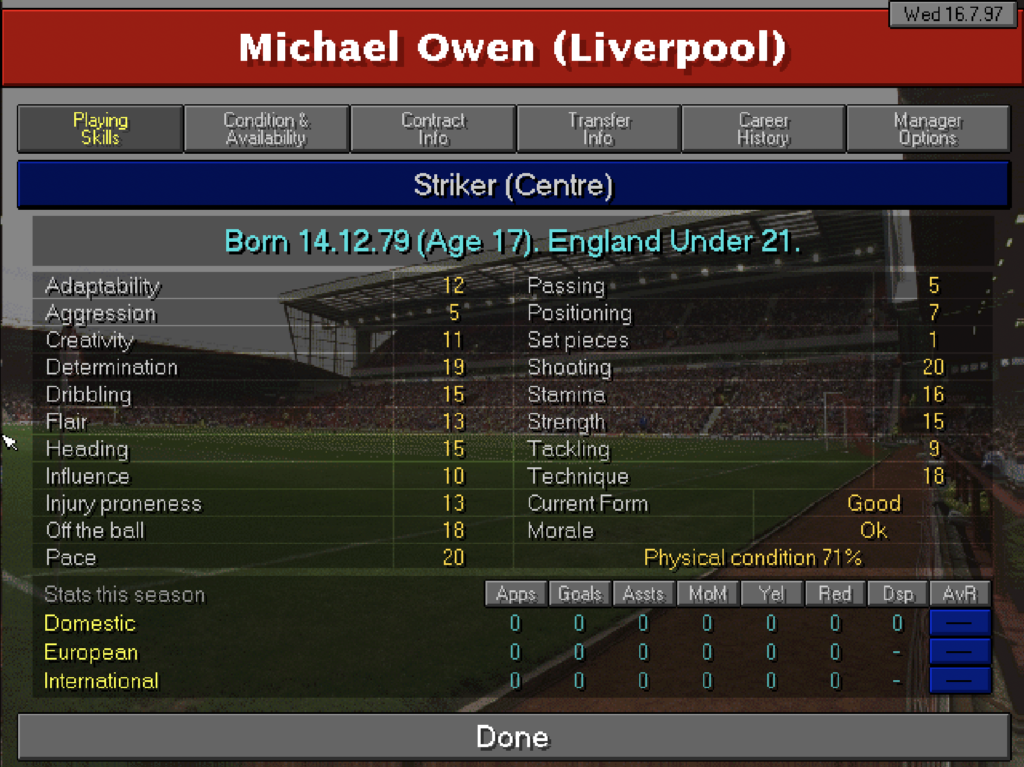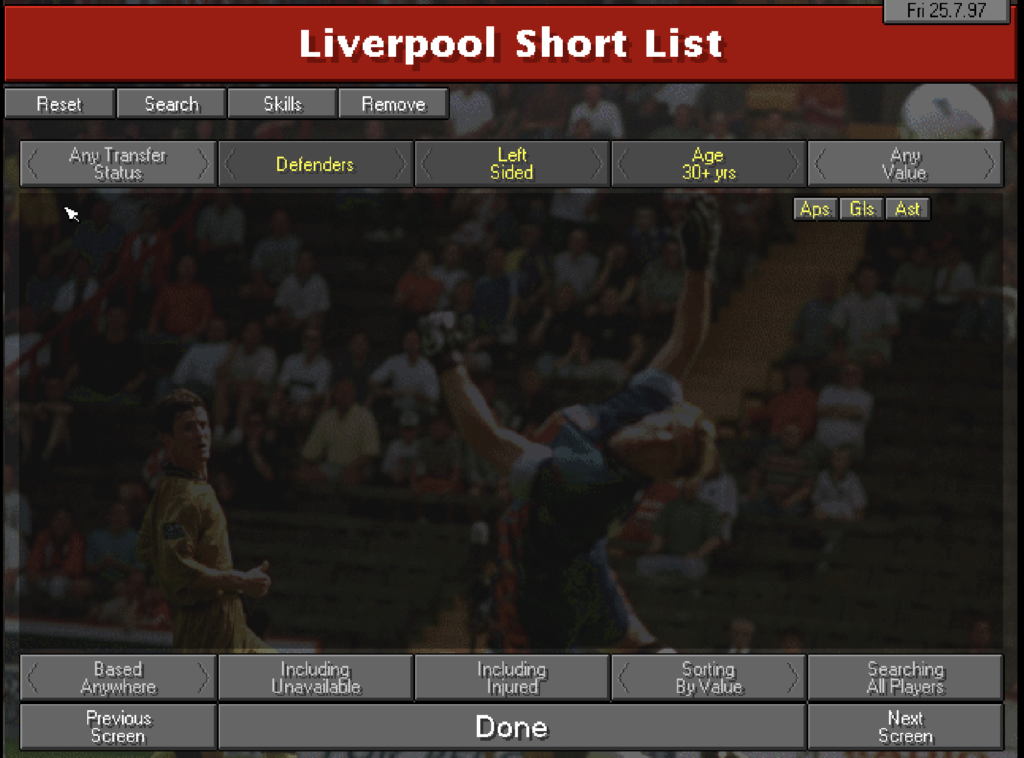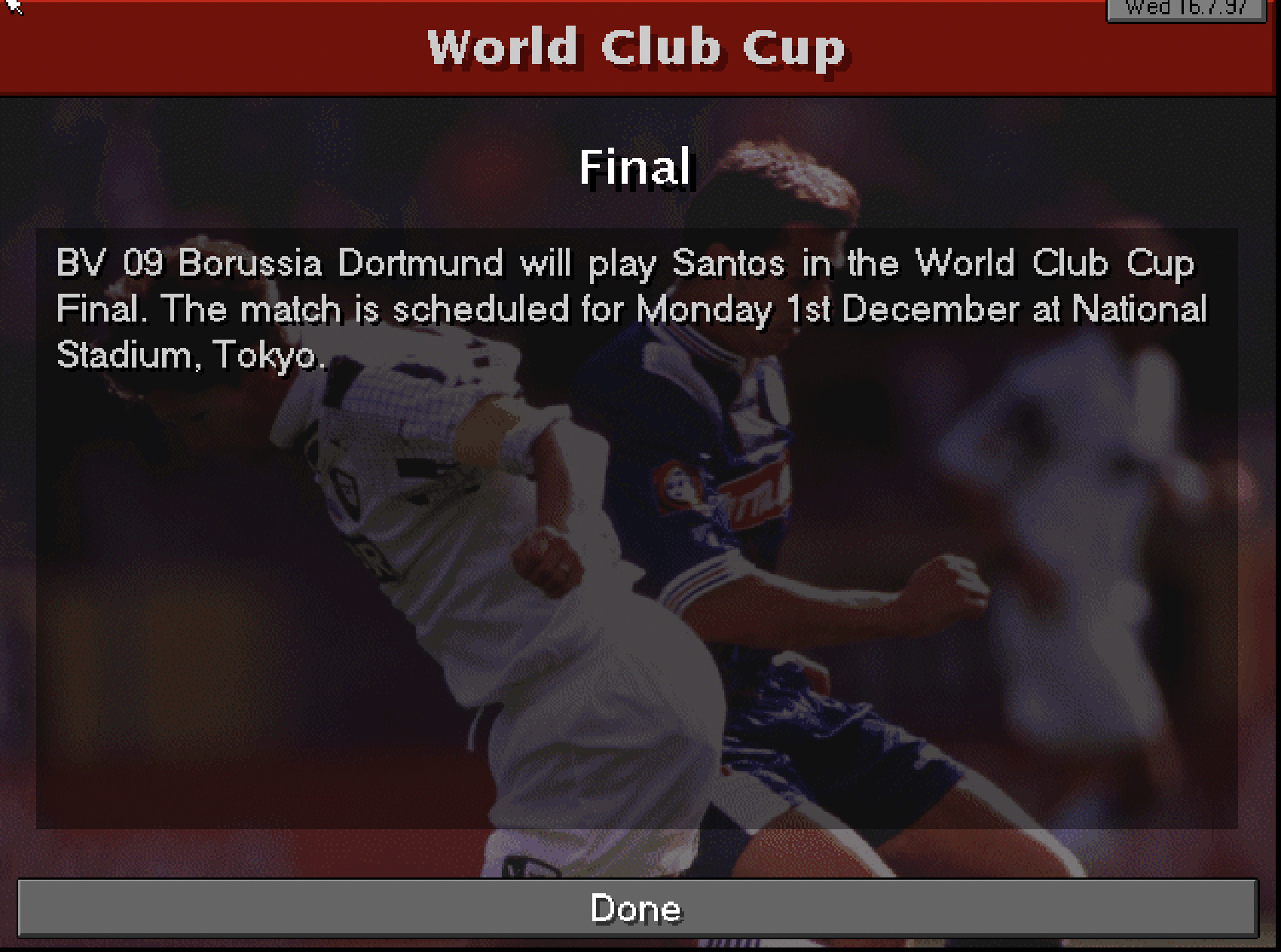Championship Manager 97/98 is not the first game of the Championship Manager series, but it is certainly considered to be the most successful to bear the name. Having been the top-selling PC game in the United Kingdom for 1997, there is still an active community of players that find ways to relive the old dos game on their modern PCs and even iPads and iPhones. I played the game through a website that runs an emulator that allows dos games to be played directly in the browser.

The Championship Manager series originated in a bedroom in England, from two amateur coder brothers who wished to make a realistic and complex game about the process of managing an association football (soccer) team.1 While the first iteration of the series, released in 1992, was not extremely popular, the game gradually became more and more famous and culminated in Championship Manager 97/98 becoming the top-selling PC video game in the UK in 1997. Sports Interactive, the company founded by the two brothers that continued to produce annual releases of the series, was eventually acquired by Sega Europe, and the series evolved into the Football Manager series today, which is very popular – Football Manager 2022, released in November 2021, reached top 10 of all played games on the platform Steam in January 2022.2 3

When playing through Championship Manager 97/98, what really stood out to me is the gamification of work that is central to the game’s gameplay and my enjoyment of it. What makes Championship Manager 97/98 so unique is that it pioneers the development of the combination of genres of football(soccer) and management, in which the sport itself, despite being the backbone of the entire game, is not visually presented to the player in any form. In CM97/98, gameplay solely consists of the player managing a soccer team in the form of buying/selling players, setting up tactics, and leading the team into simulated matches, in which results are generated in a simulated match engine based on the player’s team instructions. For the majority of the game, what the player sees is nothing but a series of spreadsheets and texts.
Indeed, everything in this game is some form of spreadsheet pulled from a database. The squads of all the teams in the game are listed in a spreadsheet, the individual player’s capacity as a professional soccer player is categorized into a rating system and displayed in a spreadsheet, and even the gameplay of leading a team into a live match consists of staring at texts. The players’ performances are calculated into “ratings” at the end of a game, and if the player wants to buy and sell players it is also achieved through spreadsheet-like interfaces.

This means that many of the gameplay is actually not so different from some form of work: applying filters to a spreadsheet to find the optimal choice, sorting through lists and analyzing numbers, regulating the finances of a team when thinking about buying and selling players, as some examples. When I was playing Championship Manager 97, I felt that I dedicated quite a lot of effort into the management process, and was actually producing what would quality as “labor” through my interaction with the game. In a sense, I was generating gamified work.
This reminds me of the Marxian concept of the estrangement of labor from the human self, how we feel estranged from our body and from our labor as a result of the alienation of our work product from ourselves – we do not own what we produce, and thus the more we work, the more we feel alienated from not only our work products but also from our labor.
Perhaps what makes Championship Manager 97/98 such a popular (and, according to, many players’ accounts, addictive) is the fact that the game is a space that allows the player to produce work that they “own,” in the sense that the labor they put into the game could actually be manifested in the form of their teams’ success within the simulated world of the game. While I did not get to complete an entire season in the game, it was very rewarding indeed to even see my team win games and see a player I bought making big contributions.

This ethos of gamification of work that is manifested in Championship Manager 97/98, and the potential effect of such gamification, is already being used in the capitalist system by corporate owners to encourage their employees. Googling the keywords “gamification of work,” the top results are all advertisements of websites that seek to teach companies how to incentivize and motivate their employees by gamifying their work, and there’s the classic example of Amazon using workstation games to make their warehouse workers more productive, and the employees’ response that gamification “help cut down on the tediousness and repetition of a nearly half-day warehouse shift” seems to be responding exactly to Marx’s claims on estrangement and how gamification seems to be addressing it.4 Whether this is a capitalist ploy to further exploit the workers or a truly meaningful step towards reclaiming enjoyment of work, gamification is a phenomenon worth further exploring and Championship Manager 97/98 is an early game that reflects some of its core ideas and how it could be popular among a general audience of gamers.
Sources
1 Hale, Ed. “The Untold History Of The Championship Manager / Football Manager Games.” RetroCollect, 28 May 2013, http://www.retrocollect.com/Articles/the-untold-history-of-the-championship-manager-football-manager-games.html.
2 “Sports Interactive.” Wikipedia, Wikimedia Foundation, 15 Oct. 2022, https://en.wikipedia.org/wiki/Sports_Interactive.
3 “Football Manager 2022.” Wikipedia, Wikimedia Foundation, 13 July 2022, https://en.wikipedia.org/wiki/Football_Manager_2022.
4 Statt, Nick. “Amazon Expands Gamification Program That Encourages Warehouse Employees to Work Harder.” The Verge, The Verge, 15 Mar. 2021, https://www.theverge.com/2021/3/15/22331502/amazon-warehouse-gamification-program-expand-fc-games.


this was a super interesting review of what sounds like a very unique game! It’s interesting to think about the idea of “management” in a video game– you mention gamified work, and how much of the game feels like reading, interpreting, and filling out spreadsheets– and how that manifests in other, more popular games where the UI may suggest less work and more game. The first thing I thought of was quite literally the VR game Job Simulator, which is exactly what it sounds like, as it, for example, allows users to work a gas station cash register in complete immersion. If you were to strip it down to its bare minimum and make it more like Championship Manager– no more easter eggs and robot interactions, just the work end– I doubt it would be nearly as successful, due to its lack of gamified work reward that you mention here. It makes me wonder if a game like this could even be successful in our contemporary, or if it would require more of a “fun” interface to keep users engaged (even if the premise is exactly the same).
The series actually is still being annually published as “Football Manager [Year],” and there’s still this cult following that plays them and some of the games in the series turn out to be some of the more popular games on Steam. The newer series do have some even more complex mechanics and there’s actually quite a lot of even more work included (imagine reading very detailed match reports filled with graphs and scatter plots). The “fun” side is probably the fact that soccer players in the game get actual faces and the match engine goes from text only to being able to visually present a soccer game in 3D. There’s also stories of how players of this series actually go into data analysis in soccer, and there’s also quite a lot of professional soccer players and coaches that play the game.
I did my review on FIFA: International Soccer, so I found this review incredibly interesting. In 1997, FIFA: Road To The World Cup 98 was released, the fifth game in the FIFA series, also very popular at the time (granted the FIFA series is even more popular now). It’s interesting how two soccer-associated video games had such differing mechanics, yet were both very popular in the same time period. I wonder if this is because they had completely different target audiences, or if their target audiences overlapped, and Championship Manager was more popular in 1997 as it was a better game in some aspects. I am assuming that Championship Manager catered to an older, or more dedicated, audience due to it being more statistics and strategy based, whereas FIFA was for the more casual player. This also leads me to the question, why is FIFA so much more popular now, if Championship Manager was winning the race in 1997? I think this is likely due to licensing and individual players/teams advertising FIFA, or perhaps FIFA’s emphasis on online play, such as through Ultimate Team.